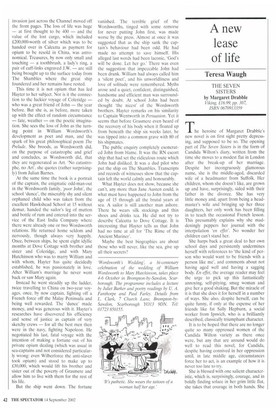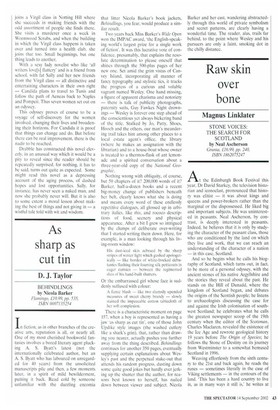A new lease of life
Teresa Waugh
THE SEVEN SISTERS by Margaret Drabble Viking, £16.99, pp. 307, ISBN 0670913359 The heroine of Margaret Drabble's new novel is on first sight pretty depressing, and supposed to be so. The opening part of The Seven Sisters is in the form of Candida Wilton's diary, written from the time she moves to a modest flat in London after the break-up of her marriage. Despite her incongruously glamorous name, she is the middle-aged, discarded wife of a headmaster from Suffolk. Her children, whom she doesn't like, are grown up and have, surprisingly, sided with their father in the divorce. She has very little money and, apart from being a headmaster's wife and bringing up her three daughters, her only work has been filling in to teach the occasional French lesson. This presumably explains why she maddeningly peppers her journal with the interpolation 'en effet'. No wonder her children can't stand her.
She harps back a great deal to her own school days and persistently undermines herself with references to 'the kind of person who would want to be friends with a person like me', and comments about not having aged well and having a sagging body. En effet, the average reader may feel the urge to pick up this fantastically annoying, self-pitying, smug woman and give her a good shaking. But the miracle of it is that she does it for herself in a number of ways. She also, despite herself, can be quite funny, if only at the expense of her friends like fat Sally Hepburn, a social worker from Ipswich, who is a brilliantly described, classically triumphant character.
It is to be hoped that there are no longer quite so many oppressed women of the Candida Wilton variety as there once were, but any that are around would do well to read this novel, for Candida, despite having connived in her oppression until, in late middle age, circumstances force her to act, is an example of how it is never too late to try.
She is blessed with one salient characteristic, which is, surprisingly, courage, and in boldly finding solace in her grim little flat, she takes that courage in both hands. She joins a Virgil class in Notting Hill where she succeeds in making friends with the odd assortment of people she finds there. She visits a murderer once a week in Wormwood Scrubs, and when the building in which the Virgil class happens is taken over and turned into a health club, she joins that too. Small beginnings, but one thing leads to another.
With a sexy lady novelist who like 'all writers love[s] flattery' and is a friend from school, with fat Sally and her new friends from the Virgil class — all distinctive and entertaining characters in their own right — Candida plans to travel to Tunis and follow the path of Aeneas back to Naples and Pompeii. Thus seven women set out on an odyssey.
This odyssey proves of course to be a voyage of self-discovery for the women involved, changing their lives and broadening their horizons. For Candida it is proof that things can change and do. But before there can be real improvement, there is the nadir to be reached.
Drabble has constructed this novel cleverly. in an unusual way which it would be a pity to reveal since the reader should be repeatedly surprised, for nothing, it has to be said, turns out quite as expected. Some might read this novel as a depressing account of the aging process, of dashed hopes and lost opportunities. Sally, for instance, has never seen a naked man, and now she probably never will. But it is also to some extent a moral lesson about making the best of things and not giving in — a wistful tale told with wit and wisdom.











































































 Previous page
Previous page